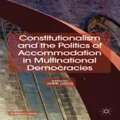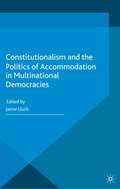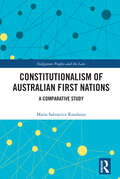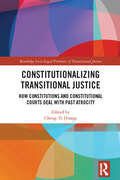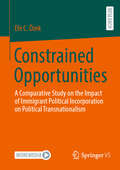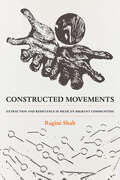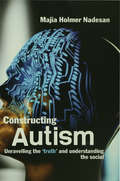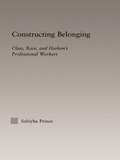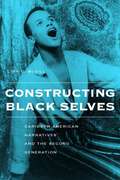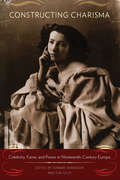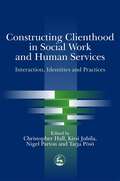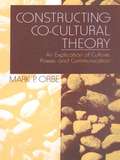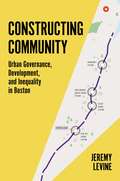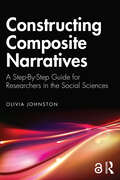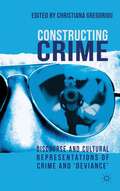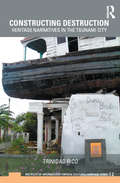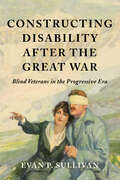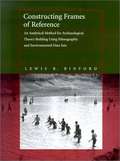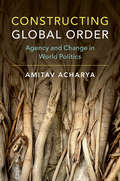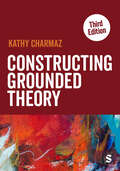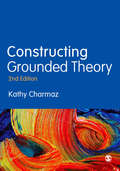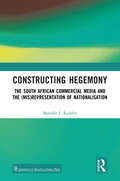- Table View
- List View
Constitutionalism and the Politics of Accommodation in Multinational Democracies
by Jaime LluchThis collection presents a nuanced analysis of a wide variety of cases that cover the spectrum of constitutional strategies of accommodation used by multinational states such as Canada, Spain, and the United Kingdom. Although constitutionalism has traditionally been the primary mechanism for facilitating the mutual accommodation of national diversity, there is a need to bridge comparative politics and comparative constitutional law. The notion of accommodation in plurinational polities needs to be unpacked and disaggregated, and all of its multiple dimensions analyzed, in order to integrate comparative politics and comparative constitutional law into the analysis. The essays in the book explore three fundamental dimensions of the politics of accommodation: constitutionalism, political culture, and nationalism. Adopting a syncretistic approach to the multiple dimensions of the politics of accommodation, this collection opens up new intellectual vistas, and provides the reader with an appreciation of the contribution that political science perspectives can make to law, and how law and jurisprudence can enrich the study of politics.
Constitutionalism and the Politics of Accommodation in Multinational Democracies (St Antony's Series)
by Jaime LluchThis collection argues that although constitutionalism has traditionally been the primary mechanism for facilitating the mutual accommodation of sub-state and state national societies in plurinational states.
Constitutionalism of Australian First Nations: A Comparative Study (Indigenous Peoples and the Law)
by Maria Salvatrice RandazzoThe book considers Australian First Nations constitutionalism by drawing on the chthonic constitutional traditions of three distinct Australian First Nations legal orders: the Warlpiri, Yolngu, and Pintupi legal orders, in the endeavour of identifying, via a comparative analysis, a core of similarities to be drawn upon and articulate an emergent legal theory common to the three legal orders. The comparative analysis is undertaken at the most foundational levels of their legal traditions, via the prism of a legal paradigm elaborated with reference to an Australian Indigenous cosmological, ontological, and epistemological standpoint. The proposed legal theory comprises a broad overview, general concepts, normative principles, and general working principles. In so doing, the book expounds how Australian First Nations constitutionalism unfolds into holistic orders of spiritual, political, and legal authority that are explainable in terms of legal theory. At the most foundational level, such elaboration may help delineate normative and legal constitutional patterns throughout Indigenous Australia.
Constitutionalizing Transitional Justice: How Constitutions and Constitutional Courts Deal with Past Atrocity (Routledge Socio-Legal Frontiers of Transitional Justice)
by Cheng-Yi HuangThis book explores the complicated relationship between constitutions and transitional justice. It brings together scholars and practitioners from different countries to analyze the indispensable role of constitutions and constitutional courts in the process of overcoming political injustice of the past. Issues raised in the book include the role of a new constitution for the successful practice of transitional justice after democratization, revolution or civil war, and the difficulties faced by the court while dealing with mass human rights infringements with limited legal tools. The work also examines whether constitutionalizing transitional justice is a better strategy for new democracies in response to political injustice from the past. It further addresses the complex issue of backslides of democracy and consequences of constitutionalizing transitional justice. The group of international authors address the interplay of the constitution/court and transitional justice in their native countries, along with theoretical underpinnings of the success or unfulfilled promises of transitional justice from a comparative perspective. The book will be a valuable resource for academics, researchers and policy-makers working in the areas of Transitional Justice, Comparative Constitutional Law, Human Rights Studies, International Criminal Law, Genocide Studies, Law and Politics, and Legal History.
Constrained Opportunities: A Comparative Study on the Impact of Immigrant Political Incorporation on Political Transnationalism
by Efe C. ÖzekThis study aims to understand political transnationalism through the political incorporation of migrants in the receiving country. With a qualitative analysis of the perceptions of transnational second-generation Turks towards the political opportunity structures in Germany and the Netherlands, it seeks an answer to the question &‘How do political opportunity structures in the receiving country shape political transnationalism among Turkish migrants in Western Europe?&’ It suggests a causal explanation for the impact of political opportunity structures on political transnationalism through a model called &‘constrained opportunities&’. The empirical results reveal &‘constraints&’ on political opportunity structures that lead to deficient immigrant political incorporation in the country of residence and reinforce political attachment with the country of origin.
Constraining Elites in Russia and Indonesia
by Lussier Danielle N.This is a thought-provoking analysis on why democracy succeeds in some countries but not others, comparing the post-transition experiences of two cases of contemporary democratisation: Russia and Indonesia. Following authoritarian regimes, democracy eroded in Russia but flourished in Indonesia - so confounding dominant theories of democratisation that predicted the opposite outcomes based on their levels of socioeconomic development and histories of statehood. Identifying key behaviours and patterns of political participation as a factor, Lussier interweaves ethnographic interview and quantitative public opinion data to expand our understanding on how mass political participation contributes to a democracy's survival. The integration of both micro- and macro-level data in a single study is one of this project's most significant contributions, and will enhance its appeal to both researchers and instructors.
Constructed Movements: Extraction and Resistance in Mexican Migrant Communities (Race, Labor Migration, and the Law #1)
by Ragini ShahA free ebook version of this title is available through Luminos, University of California Press's Open Access publishing program. Visit www.luminosoa.org to learn more. At once theoretically sophisticated and poignantly written, Constructed Movements centers stories from communities in Mexico profoundly affected by emigration to the United States to show how migration extracts resources along racial lines. Ragini Shah chronicles how three interrelated dynamics—the maldistribution of public resources, the exploitation of migrant labor, and the US immigration enforcement regime—entrench the necessity of migration as a strategy for survival in Mexico. She also highlights the alternative visions elaborated by migrant community organizations that seek to end the conditions that force migration. Recognizing that reform without recompense will never right an unjust migratory system, Shah concludes with a forceful call for the US and Mexican governments to make abolitionist investments and reparative compensation to directly counteract this legacy of extraction.
Constructing Autism: Unravelling the 'Truth' and Understanding the Social
by Majia Holmer NadesanAutism is now considered to be one of the most common developmental disorders today, yet 100 years ago the term did not exist. This book examines the historical and social events that enabled autism to be identified as a distinct disorder in the early twentieth century. The author, herself the mother of an autistic child, argues that although there is without doubt a biogenetic component to the condition, it is the social factors involved in its identification, interpretation and remediation that determine what it means to be autistic. Constructing Autism explores the social practices and institutions that reflect and shape the way we think about autism and what effects this has on autistic people and their families. Unravelling what appears to be the ‘truth’ about autism, this informative book steps behind the history of its emergence as a modern disorder to see how it has become a crisis of twenty-first century child development.
Constructing Belonging: Class, Race, and Harlem's Professional Workers (Studies in African American History and Culture)
by Sabiyha Robin PrinceLooking at the communities of Central and West Harlem in New York City, this study explores the locus, form and significance of socioeconomic differentiation for African American professional-managerial workers. It begins by considering centuries of New York City history and the structural elements of class inequality to present readers with the larger context of contemporary events. The primary objective of this study is to examine the everyday lives of black professionals in Harlem and determine what bearing income-generating activities have on ideology, consumption patterns and lifestyle, among other factors.
Constructing Black Selves: Caribbean American Narratives and the Second Generation (Nation of Nations #31)
by Lisa Diane McGillIn 1965, the Hart-Cellar Immigration Reform Act ushered in a huge wave of immigrants from across the Caribbean—Jamaicans, Cubans, Haitians, and Dominicans, among others. How have these immigrants and their children negotiated languages of race and ethnicity in American social and cultural politics? As black immigrants, to which America do they assimilate?Constructing Black Selves explores the cultural production of second-generation Caribbean immigrants in the United States after World War II as a prism for understanding the formation of Caribbean American identity. Lisa D. McGill pays particular attention to music, literature, and film, centering her study around the figures of singer-actor Harry Belafonte, writers Paule Marshall, Audre Lorde, and Piri Thomas, and meringue-hip-hop group Proyecto Uno.Illuminating the ways in which Caribbean identity has been transformed by mass migration to urban landscapes, as well as the dynamic and sometimes conflicted relationship between Caribbean American and African American cultural politics, Constructing Black Selves is an important contribution to studies of twentieth century U.S. immigration, African American and Afro-Caribbean history and literature, and theories of ethnicity and race.
Constructing Cause in International Relations
by Richard Ned LebowCause is a problematic concept in social science, as in all fields of knowledge. We organise information in terms of cause and effect to impose order on the world, but this can impede a more sophisticated understanding. In his latest book, Richard Ned Lebow reviews understandings of cause in physics and philosophy and concludes that no formulation is logically defensible and universal in its coverage. This is because cause is not a feature of the world but a cognitive shorthand we use to make sense of it. In practice, causal inference is always rhetorical and must accordingly be judged on grounds of practicality. Lebow offers a new approach - 'inefficient causation' - that is constructivist in its emphasis on the reasons people have for acting as they do, but turns to other approaches to understand the aggregation of their behaviour. This novel approach builds on general understandings and idiosyncratic features of context.
Constructing Charisma
by Edward Berenson Eva GiloiRailroads, telegraphs, lithographs, photographs, and mass periodicals--the major technological advances of the 19th century seemed to diminish the space separating people from one another, creating new and apparently closer, albeit highly mediated, social relationships. Nowhere was this phenomenon more evident than in the relationship between celebrity and fan, leader and follower, the famous and the unknown. By mid-century, heroes and celebrities constituted a new and powerful social force, as innovations in print and visual media made it possible for ordinary people to identify with the famous; to feel they knew the hero, leader, or "star"; to imagine that public figures belonged to their private lives. This volume examines the origins and nature of modern mass media and the culture of celebrity and fame they helped to create. Crossing disciplines and national boundaries, the book focuses on arts celebrities (Sarah Bernhardt, Byron and Liszt); charismatic political figures (Napoleon and Wilhelm II); famous explorers (Stanley and Brazza); and celebrated fictional characters (Cyrano de Bergerac).
Constructing Clienthood in Social Work and Human Services: Interaction, Identities and Practices
by Nigel Parton Kirsi Juhila Sue White Chris Hall Tarja PosoThis innovative book explores social work, therapy and counselling as a series of encounters - between clients and human services professionals, social workers, their colleagues and other professionals, and more widely between citizens and the state. Providing a variety of social constructionist perspectives on the idea of the 'client', it presents in-depth discussion of the roles, language and contexts of meetings between social workers and their clients. International contributors present discussion on categorization, analysing identities and reflexive practice. Drawing data from a variety of sources, including meetings, client files and transcribed dialogues with clients, the book employs methods such as conversation and discourse analysis to propose new insights into what it means to be a client of the human services agency. Bringing together a rich variety of data, this volume forms an important contribution to major debates on the nature of social work and counselling. As well as innovative approaches to theory and research, the implications for practice in social work and counselling are discussed. Challenging previously-held notions about clienthood, this book is a useful and thought-provoking resource for social workers, counsellors, policy makers, academics, researchers and students and trainers in social work and counselling.
Constructing Co-Cultural Theory: An Explication of Culture, Power, and Communication
by Mark P. OrbeThis book presents a phenomenological framework for understanding the intricate relationship between culture, power and communication. Grounded in muted group and standpoint theory, this volume presents a theoretical framework which fosters a critically insightful vantage point into the complexities of culture, power and communication. Key coverage includes: a review and critique of the literature on co-cultural communication; a description of how the perspective of co-cultural group members were involved in each stage of theory development; and an explication of 25 co-cultural communication strategies and a model of six factors that influence strategy selection. The final chapter examines how co-cultural theory correlates with other work i
Constructing Community: Urban Governance, Development, and Inequality in Boston
by Jeremy R. LevineA look at the benefits and consequences of the rise of community-based organizations in urban developmentWho makes decisions that shape the housing, policies, and social programs in urban neighborhoods? Who, in other words, governs? Constructing Community offers a rich ethnographic portrait of the individuals who implement community development projects in the Fairmount Corridor, one of Boston’s poorest areas. Jeremy Levine uncovers a network of nonprofits and philanthropic foundations making governance decisions alongside public officials—a public-private structure that has implications for democratic representation and neighborhood inequality.Levine spent four years following key players in Boston’s community development field. While state senators and city councilors are often the public face of new projects, and residents seem empowered through opportunities to participate in public meetings, Levine found a shadow government of nonprofit leaders and philanthropic funders, nonelected neighborhood representatives with their own particular objectives, working behind the scenes. Tying this system together were political performances of “community”—government and nonprofit leaders, all claiming to value the community. Levine provocatively argues that there is no such thing as a singular community voice, meaning any claim of community representation is, by definition, illusory. He shows how community development is as much about constructing the idea of community as it is about the construction of physical buildings in poor neighborhoods.Constructing Community demonstrates how the nonprofit sector has become integral to urban policymaking, and the tensions and trade-offs that emerge when private nonprofits take on the work of public service provision.
Constructing Composite Narratives: A Step-By-Step Guide for Researchers in the Social Sciences
by Olivia JohnstonThis book provides the first instructional guide to composite narrative research methods. Composite narratives are short vignettes that weave together quotes from multiple participants. The effect is to convey meaning to both academics and end-users, disseminating research findings succinctly and effectively. Readers interested in writing composite narratives will find a complete guide in this book.More and more researchers are using composite narratives to present their research findings, with support for the effectiveness of composite narratives as a research method growing. Inside this book, there is a rationale for why to use composite narratives and a complete guide for how to write them. Many examples from the author are provided, complete with audit trails that evidence how the composite narratives were written from the raw qualitative research data.Social science researchers at all career stages will be able to use this book to justify and construct composite narratives. Beginning with a discussion of this background, the proposed book will offer research students, supervisors, and experienced academics a manual for how and why to use composite narratives in social sciences research. The intended audience includes qualitative researchers in the social sciences.
Constructing Crime
by Christiana GregoriouCrime and criminals are a pervasive theme in all areas of our culture, including media, journalism, film and literature. This book explores how crime is constructed and culturally represented through a range of areas including Spanish, English Language and Literature, Music, Criminology, Gender, Law, Cultural and Criminal Justice Studies.
Constructing Destruction: Heritage Narratives in the Tsunami City (UCL Institute of Archaeology Critical Cultural Heritage Series)
by Trinidad RicoLarge-scale disasters mobilize heritage professionals to a narrative of heritage-at-risk and a standardized set of processes to counter that risk. Trinidad Rico’s critical ethnography analyses heritage practices in the aftermath of the tsunami that swamped Banda Aceh, Indonesia, in 2004 and the post-destruction narratives that accompanied it, showing the sociocultural, historical, and political agendas these discourses raise. Countering the typical Western ideology and practice of ameliorating heritage-at-risk were local, post-colonial trajectories that permitted the community to construct its own meaning of heritage. This book documents the emergence of local heritage places, practices, and debates countering the globalized versions embraced by the heritage professions offering a critical paradigm for post-destruction planning and practice that incorporates alternative models of heritage. Constructing Deconstruction will be of value to scholars, professionals, and advanced students in Heritage Studies, Anthropology, Geography, and Disaster Studies.
Constructing Disability after the Great War: Blind Veterans in the Progressive Era (Disability Histories)
by Evan P. SullivanAs Americans--both civilians and veterans--worked to determine the meanings of identity for blind veterans of World War I, they bound cultural constructs of blindness to all the emotions and contingencies of mobilizing and fighting the war, and healing from its traumas. Sighted Americans’ wartime rehabilitation culture centered blind soldiers and veterans in a mix of inspirational stories. Veterans worked to become productive members of society even as ableism confined their unique life experiences to a collection of cultural tropes that suggested they were either downcast wrecks of their former selves or were morally superior and relatively flawless as they overcame their disabilities and triumphantly journeyed toward successful citizenship. Sullivan investigates the rich lives of blind soldiers and veterans and their families to reveal how they confronted barriers, gained an education, earned a living, and managed their self-image while continually exposed to the public’s scrutiny of their success and failures.
Constructing Frames of Reference: An Analytical Method for Archaeological Theory Building Using Hunter-Gatherer and Environmental Data Sets
by Lewis R. BinfordThis book presents a detailed description of Binford's methodology and its significance for understanding hunter-gatherer cultures on a global basis.
Constructing Global Order: Agency and Change in World Politics
by Amitav AcharyaFor a long time, international relations scholars have adopted a narrow view of what is global order, who are its makers and managers, and what means they employ to realize their goals. Amitav Acharya argues that the nature and scope of agency in the global order – who creates it and how – needs to be redefined and broadened. Order is built not by material power alone, but also by ideas and norms. While the West designed the post-war order, the non-Western countries were not passive. They contested and redefined Western ideas and norms, and contributed new ones of their own making. This book examines such acts of agency, especially the redefinitions of sovereignty and security, shaping contemporary world politics. With the decline of the Western dominance, ideas and agency from the Rest may make it possible to imagine and build a truly global order.
Constructing Grounded Theory (Introducing Qualitative Methods series)
by Kathy CharmazThis is the definitive guide to doing constructivist grounded theory. From gathering rich data and conducting interviews, to undertaking coding and writing up your study, this down-to-earth book guides you through all the steps you need to do grounded theory research. This revised third edition: Showcases 9 new case studies of grounded theory research in action from scholars across the globe, including Australia, Canada, Japan and the United States. Enables you to see, at a glance, how each chapter will develop your understanding with new learning objectives. Supports you to expand your knowledge with new further reading suggestions in every chapter. Retaining Kathy Charmaz’s characteristic warm and accessible style, this book is essential reading for anyone - undergraduate, postgraduate or researcher - looking to understand and do grounded theory research.
Constructing Grounded Theory (Introducing Qualitative Methods series)
by Kathy CharmazThis is the definitive guide to doing constructivist grounded theory. From gathering rich data and conducting interviews, to undertaking coding and writing up your study, this down-to-earth book guides you through all the steps you need to do grounded theory research. This revised third edition: Showcases 9 new case studies of grounded theory research in action from scholars across the globe, including Australia, Canada, Japan and the United States. Enables you to see, at a glance, how each chapter will develop your understanding with new learning objectives. Supports you to expand your knowledge with new further reading suggestions in every chapter. Retaining Kathy Charmaz’s characteristic warm and accessible style, this book is essential reading for anyone - undergraduate, postgraduate or researcher - looking to understand and do grounded theory research.
Constructing Grounded Theory (Introducing Qualitative Methods)
by Kathy Charmaz`Grounded theory is a highly influential way of working with qualitative data and Kathy Charmaz is a major player, both innovative and fluent. This book is a model student text: lively, carefully argued and full of vivid illustrations. Beginning students and professional researchers will find it to be required reading' - David Silverman, Professor Emeritus, Sociology Department, Goldsmiths College and Visiting Professor, Management Department, King's College, University of London Kathy Charmaz is one of the world's leading theorists and exponents of grounded theory. In this important and essential new textbook, she introduces the reader to the craft of using grounded theory in social research, and provides a clear, step-by-step guide for those new to the field. Using worked examples throughout, this book also maps out an alternative vision of grounded theory to that put forward by its founding thinkers, Glaser and Strauss. To Charmaz, grounded theory must move on from its positivist origins and must incorporate many of the methods and questions posed by constructivists over the past twenty years to become a more nuanced and reflexive practice. Essential reading for students, new researchers and seasoned social scientists alike, this book is one of those rare things, a textbook that is both accessible to those new to the field but also one that has important things to say about the nature of social enquiry itself.
Constructing Hegemony: The South African Commercial Media and the (Mis)Representation of Nationalisation
by Mandla J. RadebePost-apartheid South Africa continues to face challenges in its attempts at economic transformation from decades of apartheid and colonisation. This need for revolution has resulted in various policy initiatives, including the ongoing demands for the nationalisation of the economy. The commercial media has a central role in shaping policy debates. But this media is an ideological tool and an economic resource since it is owned and controlled by people with political and economic interests and, therefore, tends to support and promote their interests. This book provides a Marxist critique of the representation of the nationalisation of the mines debate by the South African commercial media. Radebe examines corporate control of the media to articulate the interrelations between the State, Capital and the Media and how commercial media represents, shapes and influences public policy. He concludes that beyond factors such as ownership, commercialisation and the influence of advertising on news content, the global capitalist hegemony has a more powerful effect on the commercial media in South Africa than previously thought. Print edition not for sale in Sub Saharan Africa.
